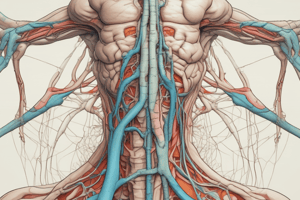Podcast
Questions and Answers
What aspect of immunity in physiology contributes to the body's ability to mount rapid and effective responses to infections?
What aspect of immunity in physiology contributes to the body's ability to mount rapid and effective responses to infections?
- Metabolomics
- Genomics
- Trained immunity (correct)
- Biological clocks
Which field of research integrates omics technologies to understand immune system interactions and responses to pathogens?
Which field of research integrates omics technologies to understand immune system interactions and responses to pathogens?
- Trained immunity
- Metabolomics
- Systems immunology (correct)
- Precision medicine
What plays a role in governing rhythmic patterns in the immune system's response to infections throughout the day?
What plays a role in governing rhythmic patterns in the immune system's response to infections throughout the day?
- Trained immunity
- The human microbiome
- Genomics
- Biological clocks (correct)
Which aspect of immunity involves using technology and research to expand our understanding of the immune system's role in health maintenance?
Which aspect of immunity involves using technology and research to expand our understanding of the immune system's role in health maintenance?
What field focuses on the dynamic nature of the immune system, emphasizing its rhythmic patterns throughout the day?
What field focuses on the dynamic nature of the immune system, emphasizing its rhythmic patterns throughout the day?
Which of the following is NOT mentioned as a critical aspect of immunity discussed in the text?
Which of the following is NOT mentioned as a critical aspect of immunity discussed in the text?
What is the main function of the immune system?
What is the main function of the immune system?
Which statement best describes the human microbiome?
Which statement best describes the human microbiome?
What is the relationship between the intestinal microbiota and the host immune responses?
What is the relationship between the intestinal microbiota and the host immune responses?
Trained immunity involves the reprogramming of which type of immune cells?
Trained immunity involves the reprogramming of which type of immune cells?
What is the significance of trained immunity in providing protection?
What is the significance of trained immunity in providing protection?
How does the human microbiome contribute to immunity in physiology?
How does the human microbiome contribute to immunity in physiology?
Flashcards
Immune System
Immune System
A complex network of cells, tissues, and organs that defends against pathogens.
Human Microbiome
Human Microbiome
A community of microbes in the human body, outnumbering human cells 10:1.
Intestinal Microbiome
Intestinal Microbiome
Microbes in the intestine that coexist and influence the immune system.
Trained Immunity
Trained Immunity
Signup and view all the flashcards
Innate Immune Cells
Innate Immune Cells
Signup and view all the flashcards
Systems Immunology
Systems Immunology
Signup and view all the flashcards
Metabolomics
Metabolomics
Signup and view all the flashcards
Genomics
Genomics
Signup and view all the flashcards
Time-of-Day-Dependent Immunity
Time-of-Day-Dependent Immunity
Signup and view all the flashcards
Homeostasis
Homeostasis
Signup and view all the flashcards
Precision Medicine
Precision Medicine
Signup and view all the flashcards
Immunotherapy
Immunotherapy
Signup and view all the flashcards
Study Notes
Immunity in Physiology
Immune responses are crucial for maintaining health and preventing infections. The immune system is a complex network of cells, tissues, and organs that work together to detect, respond to, and eliminate foreign substances such as pathogens. Immunity in physiology is a multifaceted topic that involves various aspects of the immune system and its interactions with the environment.
The Human Microbiome
The human microbiome is a vast and diverse community of microbes that inhabit various surfaces and niches in the human body. These microbes, which outnumber human cells by a factor of 10:1, are mainly composed of bacteria and play a crucial role in maintaining our health. The intestinal microbiome, in particular, has co-evolved with the host immune system, shaping it and modulating homeostasis in healthy individuals. This mutualistic relationship between the intestinal microbiota and the host immune responses is now increasingly recognized as a key aspect of immunity in physiology.
Trained Immunity
Trained immunity is a concept that describes the ability of certain innate immune cells, such as monocytes, to acquire immunological memory from previous exposure to microbial or environmental stimuli. This process involves the reprogramming of innate immune cells, which can then provide long-lasting immunity to subsequent encounters with the same stimuli. Trained immunity is a critical aspect of immunity in physiology, as it contributes to the body's ability to mount rapid and effective responses to infections.
Systems Immunology
Systems immunology is a field of research that integrates various omics technologies, such as metabolomics and genomics, to understand the complex interactions within the immune system and its response to pathogens. This approach allows for a more comprehensive understanding of the immune system's function in health and disease, contributing to the development of precision medicine.
Time-of-Day-Dependent Immunity
The immune system's function is not static but rather dynamic, with certain aspects displaying rhythmic patterns throughout the day. These rhythmic patterns are governed by biological clocks within cells and tissues and can influence the immune system's response to infections. Understanding these time-of-day-dependent immunity patterns is crucial for optimizing immunotherapies and vaccines.
Conclusion
Immunity in physiology is a multifaceted topic that encompasses various aspects of the immune system and its interactions with the environment. The human microbiome, trained immunity, systems immunology, and time-of-day-dependent immunity are all critical aspects of this complex field. Advances in technology and research are continually expanding our understanding of the immune system and its role in maintaining health and preventing infections.
Studying That Suits You
Use AI to generate personalized quizzes and flashcards to suit your learning preferences.




